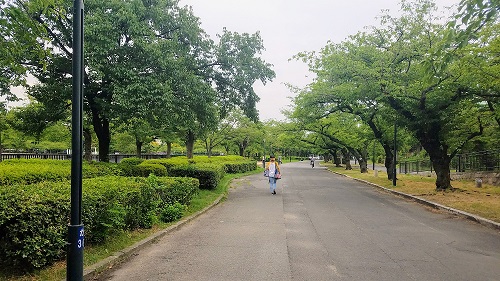
4 Reasons to Go Outdoors Today
My earliest memory of the freedom of independence was flying down the sloping hill opposite our little cul-de-sac in East Tennessee on my bike. There were two hills, actually, facing each other. One ran from our neighbor’s house down to the bottom of our cul-de-sac, and the other was our Everest on the opposite side of the street.
Riding a bicycle was, first, a method of play for us ‘cove’ kids (that’s what we called our cul-de-sac. I didn’t learn what a ‘cul-de-sac’ was for several more years.) We rode as a group around the entire neighborhood, which wasn’t small, so often I can still navigate the streets without a moment’s hesitation. Their map was burned into my mind by the many hours we spent riding from one house to the next.
In a few short years, this activity turned into me time. Our house felt full of people, all the time. Even when I escaped to my room I could feel and hear them in the house, so I moved outdoors. As a middle schooler coping with a new city and new people, riding my bicycle through the neighborhood was simply a way to clear my mind, to think.
Over the years, riding a bicycle sticks out as one of the only ways I was able to lift the burden of circumstance off my shoulders. Sadly, I haven’t ridden one in years, and often long for the freeing feeling of the wind on my face and the ground rushing beneath my peddling feet.
For a moment, disregard all the health benefits of riding a bicycle outside. Even if I didn’t get the physical benefits of riding my bike all over kingdom come, it served as a healthy activity for my mental health, lightening the mental load I carried.

As children, we didn’t hesitate to run outdoors when we were angry at our parents for telling us to clean our room, when a friend said something mean to us, or when we felt scared by things happening out of our control. We naturally went to the one place which helped us cope, helped us think, and helped ease our anxieties.
I can still feel the tension ease in my chest when I picture a much younger version of me riding past the line of trees behind our house in Northern Alabama. It’s a tangible feeling of stress and anxiety easing themselves out of me. But why is it that being outside has this effect on us? Here are four reasons to go outdoors today:
-
1. Going outdoors eases feelings of stress and anxiety.
You probably already know everything there is to know about this one. We’re told all the time to get outside when we feel stressed and anxious, or any other big emotion. But let’s look at some research for why this is the case.
This study said going outdoors helps combat the negative effects of stress on our mental and physical wellbeing. Researchers studied the effects of taking group walks in nature on stressful life events. The study said, “Nature group walks reduce the impact of a bullet, but they do not provide bulletproof protection.”
We all know that exercising everyday is good for us, but did you know people who exercise often have a different experience with stress and anxiety than people who don’t exercise very often. It works the same way with getting outside. When we expose ourselves to nature, we’re able to cope with our stressors differently than if we stayed indoors all the time.
Researchers found the frequency of the walks didn’t matter as much as simply going outside. The small act of getting outdoors had a positive effect on mental health, no matter how many times you’ve done it recently. The takeaway here is just get outside. Go sit on your porch. Take a walk down the street. Ride a bicycle. Do whatever you want to do outside but open your door and take the first step.
-
2. It helps us restore balance in our minds.
Have you ever gone to the gym to workout and left feeling just as stressed, frustrated, and anxious as you were when you walked in the building? There’s a reason for that, and this study explains why. It found exposure to greener settings in nature reported “significantly lower levels of stress than their counterparts visiting a more urbanized outdoor setting or indoor exercise facility.”
Essentially, going outside to an environment with more green plants, such as the mountains, a forest, or a park with lots of trees, actually reduces our levels of stress and feelings of anxiety, depression, and moodiness.
In this study, Attentional Restoration Theory was used to link psychological restoration with softer stimulation. By limiting the hard stimulation found in more populated, urban settings (the kind of stimulation which prevents you from being run over by a car while walking down the sidewalk), allows a sense of “being away, in which a person feels a sense of escape from the stressful demands of daily life.”
The more stimulated our brains feel, the harder it is for them to rest and the harder they have to work to keep us alive. Think back to the last time you were able to truly get away from the city. Maybe you went to a cabin tucked in the mountains or you snuck off to the beach. Where we go isn’t as important as limiting the amount of stimulation our brains receive while we’re there. If I go to a cabin in the mountains, but I’m still driving to the city every night for dinner, I’m not getting all the benefits I could from my environment.
-
3. Going outdoors improves our sleep.
I’ve honestly never slept better than at the end of a day of band camp in high school or college. The long hours out in the sun seem to both give me energy for the day and leave me drained at night. After a quick shower and a moment to rest on the couch, my eyelids would start to fall of their own accord.
The good news about this is you don’t have to spend hours and hours outside for it to improve your sleep, or be a member of the marching band. In fact, if you have a large window that lets in lots of sunlight during the day, it can have the same effects as actually going outdoors. You can get the same benefits of improved sleep from taking a walk through the neighborhood as you do from a few hours of yard work.
What does going outside do to improve our sleep? It helps set our internal clock, or circadian rhythm, where we are more awake during the day and get sleepier at night. When we expose ourselves to sunlight, the direct message we’re sending our brain is, “There’s light here. It’s time to be awake!” When we’re in a dark room or the sun begins to drift low behind the trees, the light inside our house begins to fade, which sends a signal to our brain that’s it’s time to start winding down and produce melatonin. Being out in the real sunshine during the day helps regulate our circadian rhythms, or patterns, in our brain, which help us sleep better when it’s time to lay down at night.
-
4. It clears the brain fog.
You most likely heard the term brain fog at least once in the past year, when we encountered this phenomenon more than ever before. Brain fog has been described anywhere from a fuzziness in our brains we can’t seem to get rid of, to feeling “confused, irritable, spacey, [and] unable to focus on one thing,” according to Isabelle Pikörn at insighttimer.com.
On more than one day during the pandemic my brain felt fuzzy around the edges. Thoughts would come into my mind and slip out just as quickly, unable to be caught or held onto. I’d sit down to finally get some work done, only to feel confused about why I sat down and what I needed to do. More of us experienced brain fog in 2020 during the lockdown than ever in our recent history. The long number of days spent in our homes repeating days in the same order left a feeling of mental grogginess sweeping our nation.
The best and easiest way to clear the brain fog is to get outside. Some days the simple act of taking our dog out to go to the bathroom, standing on the back porch breathing in the fresh air, and feeling the wind brush against me brought my mind back.
It doesn’t take long for the effects of the outdoors to bring mental focus, clarity, and balance back to our brains. Go stand out in the sunshine. Go take a walk for 15 or 20 minutes. Go get the mail from the mailbox and take your time walking back to the door. Just get outside!




